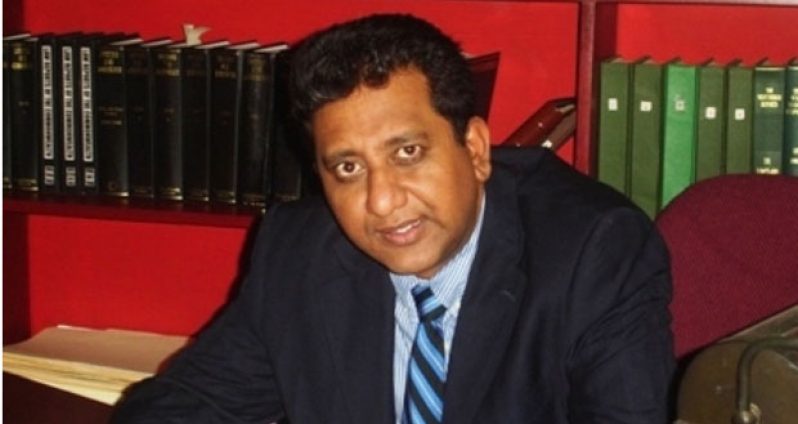“FORTUNATELY we have been able to prevent Guyana from being blacklisted and that is a significant accomplishment in regard to the state of delinquency in which we are ….”
This was Attorney General (AG) and Minister of Legal Affairs, Anil Nandlall’s summation of the situation Guyana was faced with in 2014 with regard to the Anti-Money Laundering and Countering the Financing of Terrorism (AML/CFT)Bill.
He was at the time speaking during a recent interview on NCN’s “Political Scope”, as he addressed some developments in his sector.
This limbo (probationary) state may last until September 2015, and it resulted from hard work by the Ministry of Legal Affairs, via its subject Minister. It refers to Guyana’s position, due to the non-passage of the AML/CFT Bill.
The AG explained that in many ways, AML/CFT dominated life in the Legal Affairs Ministry, as he “… was confronted with the issue of its non-passage that resulted in Guyana’s present situation of duress, that is … being put under very pronounced scrutiny and a very intense regime of evaluation and monitoring.”
Apart from this all-important Bill, the Ministry of Legal Affairs is tasked onerously, on a daily basis, to advise and guide Government and all its subject ministries.
CHALLENGE
This Bill’s occupancy directly engages the AG, and his aid is the Ministry of Finance’s Financial Intelligence Unit (FIU), the agency that is leading the initiative to make Guyana comply with all the very stringent evaluation processes, to which Guyana is now subjected as a country. However, it is the international forum that must first be tackled, and this is what can be energy-sapping and intellectually challenging.
An example of this arduous work was manifested at the Plenary Meeting XL, and Special Ministerial V Meeting of the Caribbean Financial Action Task Force (CFATF), that took place on November 24, 2014, in San Salvador, El Salvador. Guyana was represented mainly by the AG, along with a team from the FIU.
Guyana did provide the required update of its position, following the Financial Action Task Force (FATF) meeting in Paris, France, in October 2014, another phase of hard work.
The AG provided that update; informing the meeting that Guyana had submitted an Action Plan, after collaboration with the American Regional Review Group (ARRG). This Action Plan was submitted and approved by FATF at the Paris meeting, where a high level commitment was given by His Excellency, President Donald Ramotar, pledging Guyana’s commitment to implementing this Action Plan.
At the ARRG engagement, after a presentation by the AG, who explained the challenges faced by the Executive Government in Parliament, Guyana was granted until September 2015, to implement the legislative measures, and until May 2015 to implement the non-legislative measures. This salvaging recommendation was impressive and was therefore accepted at the FATF meeting in Paris.
The work for the reprieve was vital. If it had been otiose and thus refused at FATF in Paris, then potentially all of the work of the PPP/C could have been jeopardised. The reason lies in the fact, that even though the Joint Opposition members dominate the Parliamentary Committee and made recommendations, they still play a weird kind of politics-avoiding meetings and voting down the Bill, even after contributing significantly to its amendments.
HUGE CHALLENGE
The Minister pointed out that the Bill by itself is a huge challenge, as when the recommendations come, they do so in a very complex and technical language, so first one has to understand the language in what they are seeking to propagate as a law, then (documents) have to be subjected to scrutiny against the constitution to see whether (or not) they are going to be unconstitutional.
It gets even more intense, he further explained, as “the recommendations come in a vague language and that technical way of expression, so it has to be subject to analysis at various stages during that process … (then) you will have to send it back to CFATF for them to examine what you have done, and to ensure that you have satisfied requirements or recommendations that they want at that point in time to be implemented. So it is quite a complicated and tedious task to get the draft done.”
“When you get the draft, you have to take it to the Parliament where you meet another ordeal, that is, of getting it passed … not because of complexity in the legislation bill, but because of political reasons, as no one has really objected on merit to anything in these bills.”
The Opposition parties, which have been rejecting all the clauses put forward under the AML/CFT requirements, have really rejected them for reasons unrelated to the bill itself.
He explained too that Guyana right now is still at the level of the CFATF Caribbean Latin American Region, where all the countries are obligated to take appropriate sanctions, to protect themselves from a risk which Guyana itself poses, by having this bill in limbo.



.jpg)








